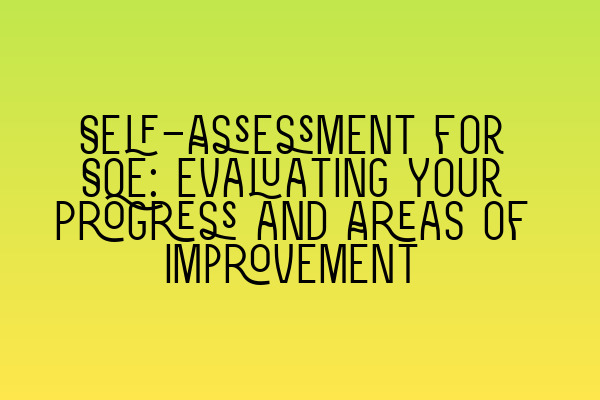Self-Assessment for SQE: Evaluating Your Progress and Areas of Improvement
As you prepare for the Solicitors Qualifying Exam (SQE), it’s important to regularly assess your progress and identify areas of improvement. Self-assessment allows you to gauge your understanding of key concepts, assess your strengths and weaknesses, and focus your study efforts on the areas that need the most attention.
In this article, we will provide you with essential insights and tips to conduct a self-assessment for SQE effectively.
Understanding the SQE Exam Structure
Before diving into the self-assessment process, it’s crucial to have a solid understanding of the SQE exam structure. The SQE consists of two stages: SQE1 and SQE2.
SQE Prep: Essential Tips and Resources for Success in Property Practice
SQE1 is a multiple-choice exam that tests your foundational legal knowledge across various practice areas. On the other hand, SQE2 assesses your practical legal skills through role-plays, written tasks, and case and matter analysis.
The Importance of Self-Assessment
Self-assessment plays a crucial role in your SQE preparation. By evaluating your progress, you can make informed decisions on how to allocate your time and resources effectively. Here are some key benefits of regular self-assessment:
- Identify areas of weakness: Self-assessment helps you pinpoint the specific areas where you need improvement. This allows you to tailor your study plan and focus on those topics.
- Boost confidence: Recognizing your strengths can boost your confidence and motivation. Celebrate your accomplishments throughout the self-assessment process.
- Track progress: Self-assessment allows you to track your progress over time. You can see how far you’ve come and identify any areas where you may have plateaued.
Steps to Conduct a Self-Assessment for SQE
To conduct an effective self-assessment for the SQE exam, follow these steps:
- Revise the syllabus: Familiarize yourself with the topics and areas of law that will be covered in the exam. This will help you create a comprehensive self-assessment plan.
- Identify strengths and weaknesses: Take practice tests and review past assignments to identify your areas of strength and weakness. Providing honest evaluations of your performance will allow for better planning.
- Set specific goals: Based on your self-assessment, set clear and specific goals for improvement. Break down larger goals into smaller, manageable tasks to stay focused.
- Develop a study plan: Create a study plan that includes dedicated time for each topic. Prioritize areas where improvement is needed, but also allocate time to reinforce existing strengths.
Interactive SQE Mock Tests for Property: Sharpen Your Skills for Exam Success
Resources for Self-Assessment
To enhance your self-assessment process, utilize resources available to you:
- Practice exams: Take advantage of practice exams to simulate the SQE exam environment and assess your performance under timed conditions.
- Mock tests: Engaging in mock tests specific to your chosen practice area can help you identify gaps in your knowledge and improve your understanding of key concepts.
- Feedback from peers and mentors: Seek feedback from colleagues, study partners, and mentors to gain additional perspectives on your strengths and areas of improvement.
Continuously Improve with Self-Assessment
Self-assessment is an ongoing process throughout your SQE preparation journey. Regularly evaluate your progress, adjust your study plan as needed, and celebrate your achievements along the way. Remember, the goal is not just to pass the SQE but to develop a strong foundation of legal knowledge and skills.
For more information on specific practice areas related to SQE, check out these articles:
- Joint Ownership: Legal Considerations for Co-Owners of Property
- Commercial Leases: Essential Insights for Business Premises
- Tenant Rights in the UK: Understanding Your Legal Protections
By incorporating self-assessment into your SQE preparation routine, you can effectively evaluate your progress, strengthen your weaknesses, and enhance your chances of success on the exam. Good luck!

Leave a Reply